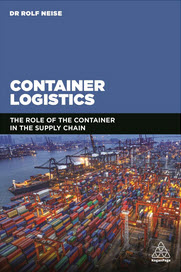Book: Container Logistics from a Shippers' Perspective
A new book by Dr. Rolf Neise examines how the global shipping container industry has witnessed an unprecedented shift as a result of a dynamic change in the global container trade landscape. Whilst the maritime container business has been studied in-depth, the impact on shippers and how shippers deal with the given challenges has not been fully examined until now.
Container Logistics: The Role of the Container in the Supply Chain looks at the maritime business from a customer’s perspective and covers areas such as the purchase of transportation services from ocean carriers and transport management, to efficient logistics execution from a supply chain perspective.
The book, published by Kogan Page, examines the challenges, solutions, and the latest developments in the container industry as well as the interaction between the different actors involved, such as freight forwarders, supply chain managers and shippers.
Neise is a lecturer at the International School of Management in Germany and a consultant supporting multinational companies in optimizing their supply chain management and logistics structures. Prior to lecturing, Neise was the Global Head of Logistics Operations at British American Tobacco responsible for defining logistics excellence in the end-to-end supply chain.
 Nik Delmeire, Secretary General for the European Shippers’ Council, said: “The timing of this book is spot on. I am convinced that this book can contribute to the dialogue that is needed between all parties in the maritime supply chain.”
Nik Delmeire, Secretary General for the European Shippers’ Council, said: “The timing of this book is spot on. I am convinced that this book can contribute to the dialogue that is needed between all parties in the maritime supply chain.”
Table Of Contents
Section - ONE: The Maritime Container Logistics Chain (MCLC);
Chapter - 01: Global Container Trade – The Past and the Future [Eyden Samunderu, International School of Management (ISM), Dortmund, Germany];
Chapter - 02: The Maritime Container Transportation Chain (MCTC) [Rolf Neise, International School of Management (ISM), Hamburg, Germany];
Chapter - 03: History and Usage of Containers in Logistics and Beyond [Hildegard Buschmann, Merle & Sheppard, Wuppertal, Germany / New Zealand];
Section - TWO: The Effective Management of the MCLC;
Chapter - 04: Empty Container Logistics – A Prospective Local Approach in the Port Of Hamburg [Marco Hofmann and Lillian Schmidt, Hamburg Port Authorities (HPA), Hamburg, Germany];
Chapter - 05: Port and Terminal Operations [Maik Ullrich and Michael Baumert, HPMPORT, Hamburg, Germany];
Chapter - 06: Multimodal Transport of Mining Equipment from Germany to Kazakhstan [Zhanat Abdugalimov, Anthony Beresford, and Stephen Pettit, Cardiff Business School, Cardiff, UK];
Chapter - 07: Cooperation and Collaboration between Shipping Lines [Alan Robertson, Webster Robertson Ltd, London, UK];
Chapter - 08: Collaboration in the Container Shipping Industry – New Technologies Enabling Collaboration between Shipping Lines and Terminals [Robert Inchausti, XVELA, Oakland, California, USA];

that matters most
Get the latest maritime news delivered to your inbox daily.
Section - THREE: The Integration of the MCLC into Global Supply Chain Management;
Chapter - 09: Global SCM and Resulting Shippers’ Requirements [Rolf Neise, International School of Management (ISM), Hamburg, Germany];
Chapter - 10: Advanced Benchmarking and Market Intelligence – A Key Instrument in Optimising Container Logistics Procurement [Björn Klippel, TIM Consult, Mannheim, Germany];
Chapter - 11: Formation of a Shipper Council to Improve Data Quality and Share Best Practices [Gregory Kefer, Infor Corporation, San Francisco, USA];
Chapter - 12: IoT Solutions in Maritime Logistics: Transports of Perishable Dairy Goods [Stefan Viehmann and Hans-Thoralf Bieber, Kuehne + Nagel (AG & Co. KG), Hamburg, Germany];
Chapter - 13: The Service-Dominant Perspective to Create Value in the Maritime Business [Qeis Kamran, International School of Management (ISM), Dortmund, Germany];
Chapter - 14: Industry Trends and Opportunities [Rolf Neise, International School of Management (ISM), Hamburg, Germany]
